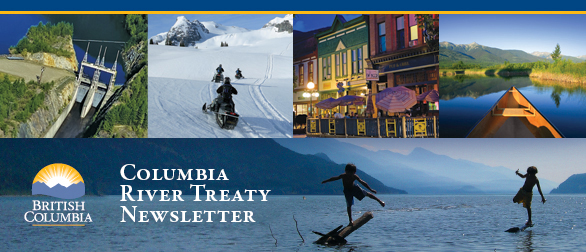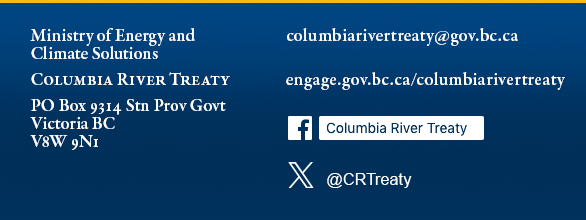Columbia River Treaty
Edition: September 2021

Indigenous representation and reconciliation in the Treaty modernization process
Sep 28, 2021
The Columbia River Treaty (CRT), and the dams and reservoirs built within the territories of the Ktunaxa, Secwépemc, Syilx Okanagan and the Sinixt Nations, have impacted Aboriginal title and rights in the Basin. Over 1,000 km2 of productive ecosystem and habitat that had sustained the Indigenous Nations culturally, economically, and socially since time immemorial was destroyed.
Starting in 2011, the Province engaged in Indigenous and public consultation around CRT modernization, and in 2014 this resulted in the development of the B.C. Decision and Guiding Principles to negotiate a modernized Treaty. Importantly, these principles included the “consideration of Aboriginal rights.” The Province furthered its overall commitment to the UN Declaration on the Rights of Indigenous Peoples (UNDRIP) and working with Indigenous Nations by passing the 2019 Declaration on the Rights of Indigenous Peoples Act. This is the backdrop against which the Ktunaxa, Secwépemc and Syilx Okanagan Nations (Indigenous Nations)[1], B.C. and Canada have led the way on engagement and partnership regarding CRT modernization.
Canada and B.C. are committed to seeking Indigenous Nations’ free, prior and informed consent on the outcome of the modernized Treaty negotiations. Further, the Negotiation Framework Agreement, signed by the Indigenous Nations, Canada, and B.C., has set up a process and developed a relationship that has the five governments, together, effectively prepare and engage in negotiations with the U.S.
Since early 2018, the Ktunaxa Nation Council, Shuswap Nation Tribal Council and Okanagan Nation Alliance, Global Affairs Canada and Ministry of Energy, Mines and Low Carbon Innovation have worked closely to develop and refine negotiating positions and strategies. This consensus-based group is called the Negotiations Advisory Team (NAT). In April 2019, Canada, which is responsible for the make-up of the negotiation team, announced that Columbia River Basin Indigenous Nations would participate as observers in the Treaty negotiations – an important and unprecedented step in demonstrating Canada’s and B.C.’s commitments to UNDRIP and to the journey towards reconciliation.
As observers, Indigenous Nations are present at all negotiating meetings, fully participate in caucus meetings with Canada and B.C. during negotiation sessions, and debrief with Canada and B.C. after each negotiation round. The Indigenous Nations are also full participants in preparatory meetings with Canada and B.C. between negotiating sessions.
Alongside the work of preparing and engaging in CRT negotiations, the NAT also continues to work domestically in B.C. on better understanding and improving how the CRT is implemented in the Canadian Columbia Basin. Together, the NAT is working on Indigenous-led ecosystem function research within the Columbia system, Indigenous cultural values, CRT domestic governance, and a Planning Model to better collectively assess CRT impacts, and find pathways for potential improvements. This work is ground-breaking in B.C. in its collaboration and coordination with Indigenous governments.
Whatever the outcome of the modernization talks, the partnerships forged, and deeper mutual understanding resulting from this collaborative work will contribute to the journey towards reconciliation within the Basin.
[1] The Lakes Division of the Confederated Tribes of the Colville Reservation in Washington State, the successor tribe to the Sinixt in Canada, are being consulted on the modernization of the Columbia River Treaty by the U.S. Administration.


